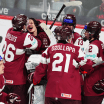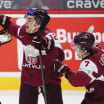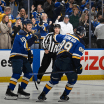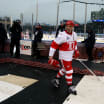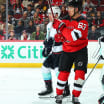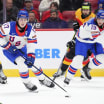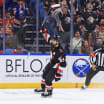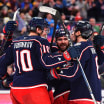Keefe says consistency key to Maple Leafs improving defensive play
Coach discusses 'honor' of working for Toronto, challenges of job in Q&A with NHL.com
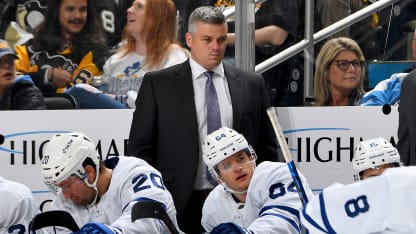
© Joe Sargent/Getty Images
Consider it done.
Once known for their wide-open play, Toronto has reverted to a more tight-checking style this season and has allowed the third-fewest goals in the NHL (48).
"The guys are buying in and finding that it works when we do that," the Maple Leafs coach said. "It takes effort all over the ice and we're getting that.
"We've shown in the past we can play this way, but we haven't been consistent with it and that can cause second-guessing. They've stuck with it and we're getting results."
The Maple Leafs have overcome a sluggish start to win 13 of their past 15 games and are one of the NHL's hottest teams heading into their game at the Anaheim Ducks on Sunday (8 p.m. ET; BSSC, BSSD, TSN4, ESPN+, NHL LIVE). Toronto won its third straight with a 4-1 victory at the San Jose Sharks on Friday, the sixth consecutive game the Maple Leafs have allowed two goals or fewer.
"I think that is what we've been keying in on over the last little bit here," forward Wayne Simmonds said. "Everyone has done a really good job. We've made a conservative effort over the last long haul here to make sure we play this game well defensively and eventually offense will come through."
Credit Keefe's dedication to defense for that.
Toronto is 77-35-13 since Keefe replaced Mike Babcock as coach Nov. 20, 2019. But a 2-4-1 start to this season had fans concerned and wondering about the coach's future.
"You stick with what you're trying to do even when you're struggling," he said. "We got out of it."
The turning point was a 3-2 victory against the Chicago Blackhawks on Oct. 27. The win ignited a 13-2-0 run that has the Maple Leafs (15-6-1) tied with the Florida Panthers for the lead in the eight-team Atlantic Division.
NHL.com spoke 1-on-1 with Keefe this week about the Maple Leafs' resurgence, the challenges of coaching in Toronto and the emphasis on giving up fewer goals.
The Maple Leafs turnaround has featured a much stingier defensive team game than we've seen in the past. What has been the key to the improvement in goals against?
"Adjustments are a part of it, sure. But it's also the learning process you go through like I have in the past two years. At any any level you're growing, you're evolving. You're learning more about the needs of your players in terms of what they need for motivation and for development. You have to ask yourself, 'What does the team need from me?' Those are the things I think where I've grown the most is just, you know, that understanding that's really what I would have for years, and then just being able to adapt and adjust to the demands of the schedule and the routines that come with it. The guys are faster and the schedule is more intense than in the American Hockey League but there's not really a lot of difference in X's and O's. You have to believe in what you're doing and get your players to believe it too."
How have you grown as a coach in the past two years?
"One of the greatest challenges is to learn from other coaches and other teams while not just spending our time trying to be like everybody else. Instead, you have to ask, 'What's best for us in our group?' That's one of the biggest challenges. Certainly there's a lot of really smart coaches out there that implement some very, very good tactical structures and systems that you can learn from, so I think it's important. You've always got to pay attention to that."
How have you handled the roller coaster of emotions the past two seasons, coming off successful regular seasons only to be eliminated in the first round of the Stanley Cup Playoffs each postseason?
"Being the coach of the Toronto Maple Leafs, with the team's rich history, is an honor. It's not lost on me. I feel fortunate every day to go to work for such a first-class organization. Our fan support is unbelievable, even on the road. So it's my job to help produce the best product possible. That's the pressure you put on yourself. You embrace it."
Having said that, there were calls for organizational changes after the Maple Leafs were eliminated by the Montreal Canadiens in the first round last spring and again after the slow start this season. How do you and the team handle the white noise that goes hand in hand with being in hockey-mad Toronto?
"I just have to follow up and do what we're asking our players to do, which is to block out all that noise. I mean, it's not hard for me to do on a personal level. But there are things with my life and family that naturally draw me away from my own bubble. Sometimes you get some of that and you have to ignore that. But the people in my life are respectful and so too is the community. We have to focus on our own jobs, but at the same time, I appreciate that. People care a lot about what we're doing. And that's what inspires me. Always has. When I coached the Pembroke Lumber Kings (in the Central Canada Hockey League) I felt the same amount of pressure. You're just coaching at a different level, but I was getting recognized in restaurants in Pembroke back then like I am in Toronto now. It means people care."
Finally, how do you shield your family in an environment where you're a hero when you are winning and a scapegoat when you're losing?
"Having a young family in this role is unique in a market like this. You're constantly making a decision each day about whether to shield yourself and your family from being out and about and things that. Or being present and allowing your kids to live a normal life and all that. I've got two boys playing AAA hockey, and that in itself has me in and out of the rinks with them and all of that. So that creates extra, extra layers. I've been involved in minor hockey here for a few years, so it's not a novelty for most people who see me there. They're respectful, and I appreciate that."




